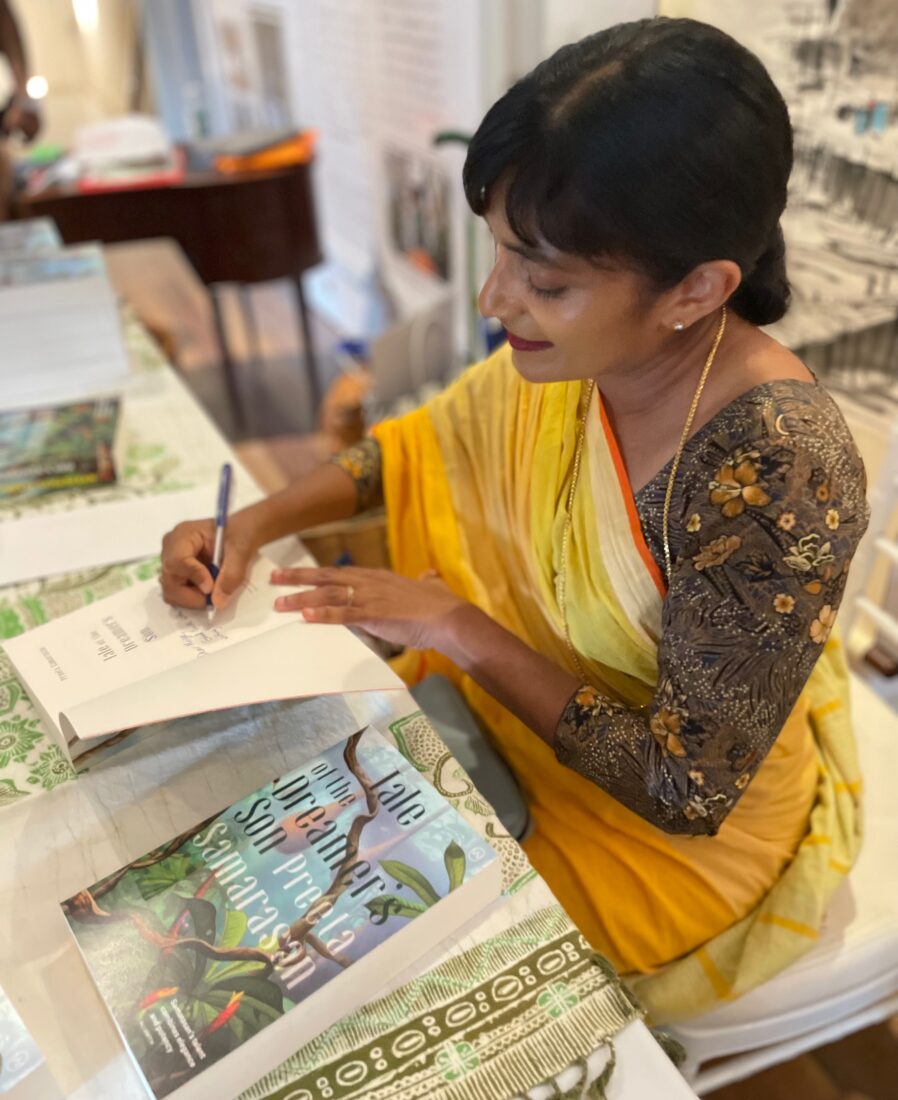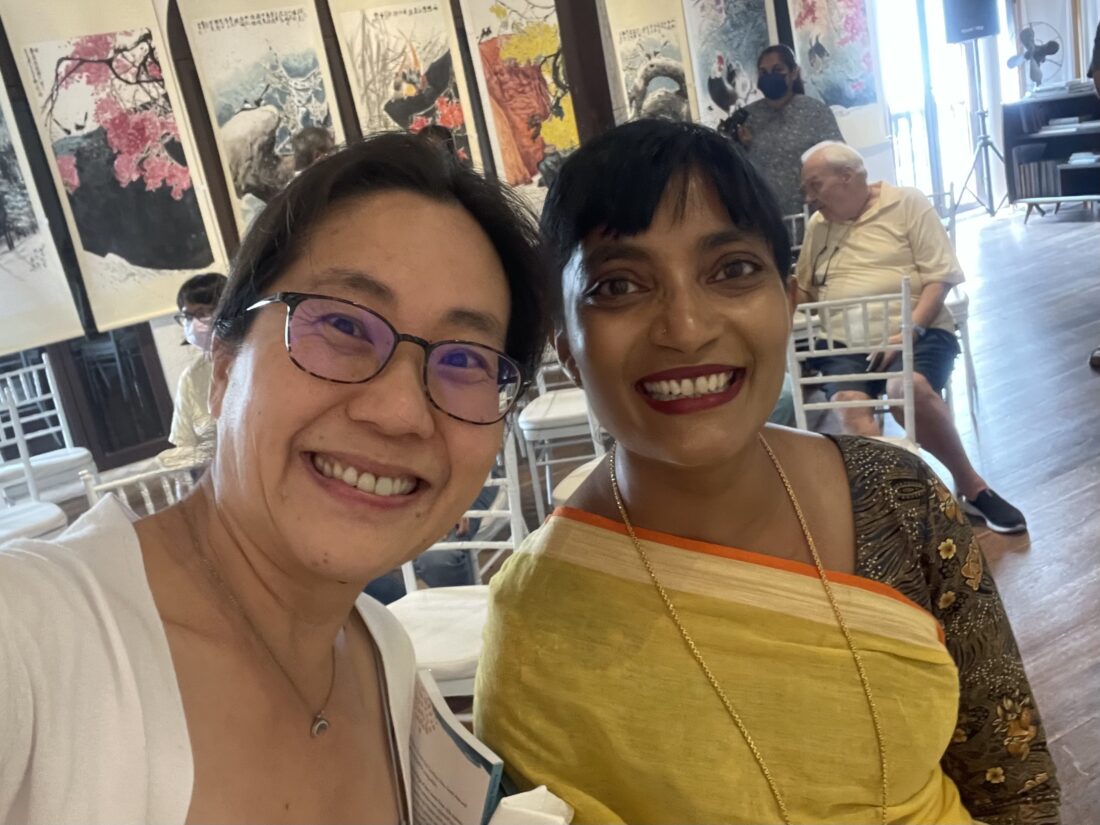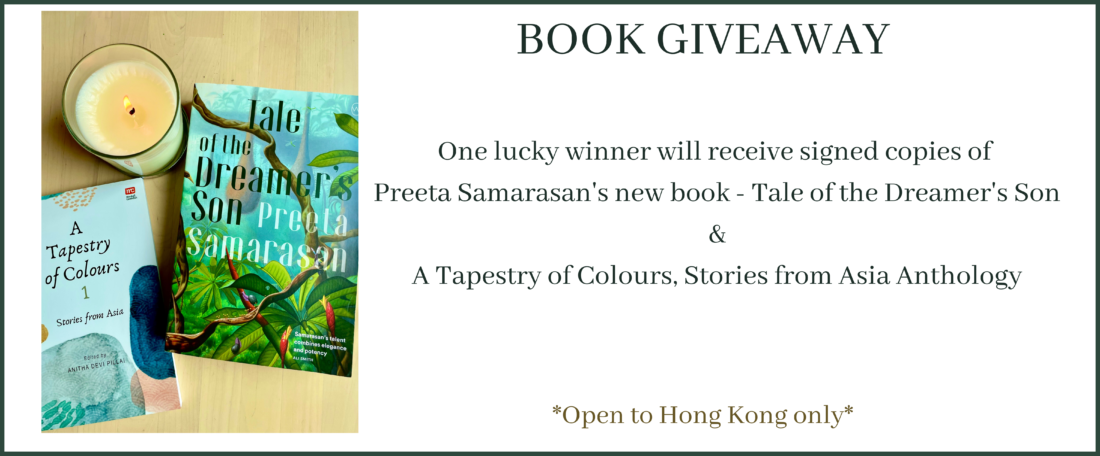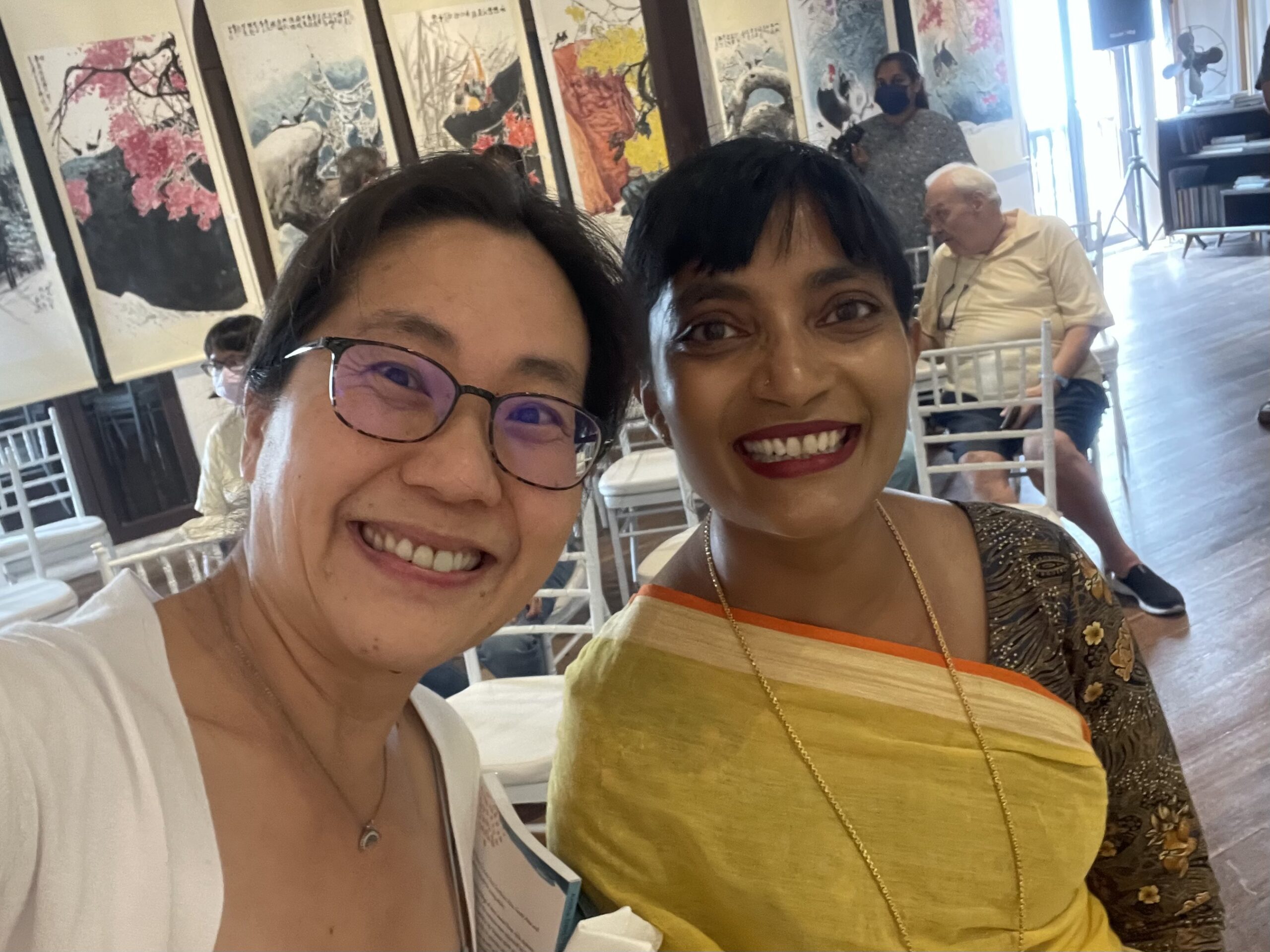In conversation with Author Maureen Tai

Author Preeta Samarasan ( Evening is the Whole Day and the recently released Tale of the Dreamer’s Son) and author Maureen Tai (Itterasshai: Go Well and Come Back, a short story) finally met in person after connecting virtually during the height of the pandemic. The venue was their shared hometown of Ipoh where they discovered they had mutual friends, interests and writerly thoughts. Over roti and teh tarik, they talked about the questions they wish people would ask them when it came to their writing.
What is it that publishers or editors sometimes advise authors to do that you find most troubling?
Preeta Samarasan It is this idea of redemption. People have read my novels and said “It’s just too bleak. Can you make it more hopeful? Can you add a note of redemption?” For a long time, I felt this perspective comes out of America and the way Americans approach fiction, or maybe life even? I don’t know if I’d go that far, but I have resisted this advice, although one could argue that the book I’ve just published, Tale of the Dreamer’s Son, has a note of redemption at the end. The truth is, I had written it like that anyway without being asked to as it was true to my character as I’d created him. But sometimes, I feel that no note of redemption is necessary because that is not how life works. There are times when you look back on your whole life and it feels wasted, and there are people who experience life like that. Should we never write about them? Like Stevens in Remains of the Day, is there a note of redemption in it? No, there isn’t.
There are other books like that which I find moving and somehow useful in an emotional way. If you talk about why we read fiction and novels, I find that there’s something that I can take from these stories where redemption is just not possible. It’s not that I look at these lives and think, “Oh, I don’t want to live my life like that, I’ll be different and make sure my life isn’t a series of wasted opportunities.” It isn’t as simple as that, I think it’s more subtle that I read these books and I feel that there’s a kind of honesty in them, which is valuable in and of itself. Someone has seen this circumstance that happens – that can happen – to human beings and told this story – not just for that person to read but for others to know that it happens. That’s what storytelling is, isn’t it? To tell the breadth of human emotion and human experience.
Maureen Tai: Maybe this is also driven by the type of narrative, because I find this sort of bleakness we’re talking about exists in a lot of Japanese fiction I read, in translation of course. Bleak, yet it comes across as a sort of beauty – the works celebrate the melancholy, the loss. Life isn’t a nice perfect parcel with a happily-ever after-ending. There is beauty in sadness, in being lonely, in being grief-stricken. This wistfulness is evident even in Japanese movies. One of my favourite Japanese movies is called The Departed (“Okuribito”), about a failed cellist who becomes an embalmer. It’s all about death and disappointment, but is also heartachingly gorgeous.
Why do you write for children and not for adults?
Maureen Tai: I’ve thought about this a lot. I didn’t come to children’s writing consciously, but what American kidlit author, Kate DiCamillo said – and I paraphrase – the sacred responsibility to write for children is to tell them the truth and make it bearable – really resonated with me. While many different kinds of children’s books exist, I think there are certain hard truths and realities in life that children face, which needs to be written about and acknowledged in what they read. Children have difficult lives, more than ever now, because they can’t be completely shielded from the ugliness around them the way we were when we were growing up. So we need books to help adults, and parents like us, talk to children about those situations, and the kids themselves need books they can connect with on that level of intimacy and understanding. I’m lucky to be a mother and have some insights on how children respond to the world around them. I feel I have a responsibility to write for children to help them make sense of it.
Preeta Samarasan: For me, the inherent difficulty of being a child is that you are subject to all the laws of the adult universe without any power or agency, so they have to approach things – like grief, loss and death – differently with different tools.
Maureen Tai: Perhaps this lack of power is why there’s a real push in kidlit to show the child protagonist overcoming difficulties and triumphing in the end, albeit with the aid of some magic stone or hidden power, because this narrative arc returns that power, that agency to kids.
Preeta Samarasan: Yes, but sometimes I think there has to be an acknowledgement of this powerlessness because the reality is that you can’t change certain things. Obviously, you can change the way you think about things or how you respond to them, but for me, the most powerful books, be they for children or adults, are books that accept that reality, that say it’s too late, that say that you can’t always fix everything, but that also say that you will go on, you will find a way to carry this for the rest of your life.
Why do you always write about death, loss and grief?
Maureen Tai: I’ve been very lucky [touching wood] not to have experienced – yet, of course, because it is inevitable – the death of someone extremely close to me, so I think I dwell on death almost as a dress-rehearsal for what is to come. Morbid preparation, I guess. But death is just one of a series of events that cause loss and grief. I experienced long and deep periods of loneliness oddly enough when I was a university student in Canada, cut off from family and friends (in those pre-Internet days) and it was from that experience that I was able to appreciate – in hindsight of course – its value and beauty. There is beauty in being extremely sad, lonely, left behind, outside. As you said, this is something worth writing about and acknowledging.
Preeta Samarasan: In a way, it’s also about moving through the world on a daily basis with a heightened sense of awareness because loss is always there in some shape or form. Everyone around us is experiencing some sort of loss or is going through something difficult in their lives, but all of us, by and large, try not to think about it, try to avoid verbalising it, because we have to get things done – take the kids to school, put food on the table. The fact is though that this sense of loss is always there under the surface everywhere in the world. If we only looked more carefully… maybe, that is what adds beauty and meaning to every human interaction we have.
Maureen Tai: It’s also connected to vulnerability isn’t it? So easy to talk about happy things but extremely difficult to talk about things that make you sad, to say to someone “I feel so lost”. If you can say that to someone, you expose your heart, but you are also inviting a deeper connection with the person. I think this is also the sort of connection you can have with a book. My twelve-year old son and I still read together and the one book he has voluntarily picked up to reread is Louis Sacher’s There’s A Boy in the Girl’s Bathroom. There is an extremely sad moment in the story, which made us both cry when we read it the first time around. My son remembered – still remembers – that moment of sadness or vulnerability, and seeks to revisit it. So I want to write books, which do that. Make readers return to my work because they feel something so deep and profound. Loss, grief and death provide this connection in a much deeper way than toilet humour or euphoria.

What are some fictional characters that most haunt you?
Preeta Samarasan Without putting too much thought to this, I tried to come up with fictional characters that I think of on a daily or near daily basis. One I’ve mentioned is Kazuo Ishiguro’s Stevens. Another is Mohan Biswas from A House for Mr Biswas by V.S. Naipaul. I was quite young when I read the book for the first time, and even then, I saw so many similarities with my own father. That generation of men who had dreams for their own families, some of which they just couldn’t fulfill. They were hampered by so many things like tradition, their own culture, colonialism – always coming up against these obstacles when they had grand ideas of who they could be.
The third person is Heathcliff from Wuthering Heights, which I admit is completely random! Maybe he’s been on my mind because I was in a bookshop in London recently looking for a cloth-bound classic for my daughter for her 13th birthday. I approached one of the booksellers at the store, a woman around my age, and when I asked her, she immediately said, “Wuthering Heights! It is THE 13- year-old-girl book!” But of course! That had been my instinct as well when I read it around the same age, and there was something so romantic about it. Also, somehow, this tragic figure, Heathcliff, so broken and ruined, allowed me to feel some sort of sadness that I hadn’t yet felt at that age in a book. I think as I’ve grown up, become a writer myself and thinking critically about books – he is someone who comes back to me because he embodies some of the ideas and themes that we’ve been discussing.
After writing the three names, however, it struck me that none of them are women. I look back and see two white men and one brown man, so what does this say about me? [both laugh] I don’t have an answer. At some level, I’d have thought I’d be haunted more by women characters who are more like me, who mirror my experiences, but when I asked myself spontaneously, these are the three names I came up with.
Maureen Tai: Is it because you read these books when you were very young though? Maybe that’s part of the reason why writing for children seems so important to me because a lot of our earliest memories of what stays with us for the entirety of our lives actually happen during our childhood.
Preeta Samarasan: Absolutely, they are called the formative years for a reason!
Maureen Tai: Right? Our reading habits are so solidified in our childhood, so if these habits aren’t started early enough – to read widely or often or deeply – then the opportunity for literature to be a profoundly affecting part of our lives through to adulthood is lost.
Preeta Samarasan: I also think that when you’re a child, it’s a different way of reading as well. You never read the same way again because, as an adult, you’re dissecting the work and analysing it, thinking about it critically as the classroom requires you to. But it’s not just that. It’s also growing older that we read differently because we bring to it so much baggage – not just classroom baggage – but our own life baggage. When you’re a child, and you’re just reading hungrily for the sake of it, and you lose yourself in the story, that maybe enables a different kind of connection with the characters. It’s a close, intimate one, not distant.
Maureen Tai: Children look at things with such newness and freshness that it can’t be replicated once it’s gone. This is part of the reason why so many of us – and that includes me! – constantly mourn the loss of our childhoods, and the innocence. But I am so glad we were able to revisit our mutual childhood home and relive some of those memories together for the first time!
Preeta Samarasan: Yes, and it feels especially meaningful to have had this conversation about reading and writing – activities that defined my childhood, and for both of us, I think – in our home town, the site of so many memories.



Thank you both for this, for these insights. Grateful
What a really fascinating interview; I love how it really delved into a lot about the author’s approach and philosophies — which were themselves really interesting. Thanks for sharing! Molly | transatlanticnotes.com